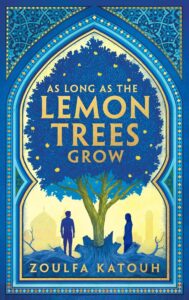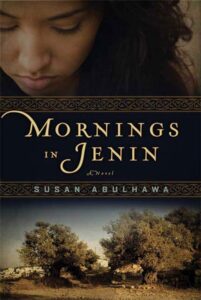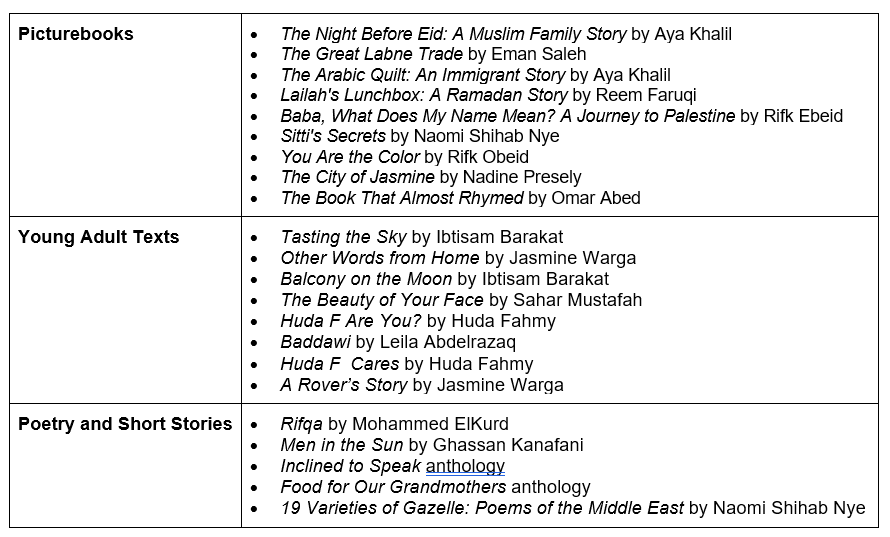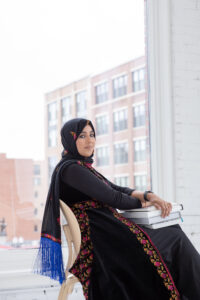This post was written by Dr. Sawsan Jaber, member of the NCTE Committee Against Racism and Bias in the Teaching of English (CARBTE).
A language arts classroom has transformative power to shape our perceptions of the world, its cultures, and its people. Narratives presented in language arts classrooms have left an indelible mark on our understanding of society. In this moment, we see how impactful narratives can be as we watch the news coming from Gaza. Narratives can perpetuate harmful stereotypes that dehumanize others.
As gatekeepers of knowledge, we sometimes inadvertently teach narratives rooted in our own experiences and comfort zones, frequently missing the mark on what students need. Often, there are racial gaps in these classrooms, as we know, and this reality of incorrect narratives is harmful to students, their perceptions of others, and their perceptions of self. One community regularly presented in racist and biased ways is the Arab community. Arabs have long been a target of misrepresentation in the form of literature and media, which is present in language arts classrooms. Common misconceptions shadowing Arab bodies are many. Americans have normalized and justified the alienation, demonization, and violence against Arabs. Educators have immense power in shifting this reality to foster a more accurate, nuanced understanding. One that leads to a better humanity.
Recognizing the Misconceptions:
- They are to be feared. Western media, traditional school curricula, and elected officials have perpetuated divisive stereotypes of Arabs and Muslims by elevating a culture of fear around who they are. It has desensitized people from seeing violence inflicted on them as criminal, such as violently taking off hijabs.
- Arabs are a monolith. One pervasive misconception around Arab identities is that all Arabs are Muslim and all Muslims are Arab. Since Islam is a faith, Muslims come from all ethnic and racial backgrounds. Arabs are people who come from one of 22 Arabic-speaking countries in the world. The diversity of the Arab world is vast.
- Arabs are a threat to the American way of life. This perception, rooted in the belief that Arab values clash with American values, fosters a sense of othering. The post-9/11 era has exacerbated this fear, reducing all members of the Arab world to a harmful stereotype of a terrorist.
- The Arab world oppresses women. Women of the Arab world are often portrayed as weak, oppressed, and lacking agency and voice. Like most women in the world, the struggle for equality exists in many countries; however, it is essential to avoid generalities and to avoid being hyper-focused on women in the Arab world in isolation as though they are an anomaly.
Shifting the Narrative:
Recognizing the tropes listed above in the literature we teach and consume is an important first step. A useful next step is to diversify the texts we use with students. We must challenge one-sided narratives and promote inclusivity. While diversifying texts is a key to ensuring there are accurate mirrors for Arab students and a multitude of windows for all other students, it is easy for these tools to become weapons if they are taught by teachers who have not done the work to unlearn much of what we were taught by being immersed in the same single stories through our own education. We need to design and co-design instruction that encourages students to examine stereotypes and question their validity while encouraging open discussions to challenge preconceived notions.
When teaching the narratives of historically marginalized groups, it is easy to get mired in the tragedies inflicted on those groups, reducing them to those tragedies and stripping them of their identity beyond their oppression. It is important to elevate and celebrate the humanity of Arabs, the richness of their cultures, their hospitality, and their tremendous contributions to science, math, art, and literature. This humanizes Arabs and showcases their coexistence, their intellect, their resilience, and their creativity.
The Texts I Recommend
 While The Kite Runner by Khaled Hosseini seems to be the go-to when attempting to integrate Arab voices in
While The Kite Runner by Khaled Hosseini seems to be the go-to when attempting to integrate Arab voices in curricula, there are problems with it. It is a beautiful literary piece, but it has become the single story to represent Arabs. Not only is Khaled Hosseini not Arab, but Afghanistan is not an Arab country.
curricula, there are problems with it. It is a beautiful literary piece, but it has become the single story to represent Arabs. Not only is Khaled Hosseini not Arab, but Afghanistan is not an Arab country.
Instead, consider As Long as the Lemon Trees Grow by Zoulfah Katouh. I would recommend the novel for a high school audience due to some of the depictions of the images of war in Syria. Syria’s rich history, the resilience of the Syrians, the love of the people for each other and their homeland, and the human condition as a whole—this novel is a work of art; Katouh paints with words.
A mirror for me has always been Mornings in Jenin by Susan Abulhawa. Also for high school readers, it traces the general trauma of a displaced Palestinian family. It centers an often ignored voice: the Palestinian people. Not only does this novel humanize Palestinians, it creates a deeper understanding for a history that goes beyond the events of October 7th, 2023. The novel can contextualize current events for students.
Here are more texts I recommend across grade levels:

As educators, we shape society’s future through our students’ learning experiences. We help them to gain understanding and develop human-centered, loving narratives. Given the moment, this work is imperative. The question isn’t whether to leverage language arts spaces, but how to do so effectively. Purposefully embracing Arab voices benefits all students, fostering a more inclusive world where diverse perspectives are celebrated, empathy reigns over fear, and literacy truly liberates us.
 Dr. Sawsan Jaber is a global educator, presenter, equity strategist, curriculum designer, community activist and keynote speaker of 20+ years. She has held a variety of leadership positions both in the U.S. and abroad. Dr. Jaber is currently a high school English Department Chair, District Equity Leader, and teacher at Maine West High School in Park Ridge, IL. Dr. Jaber founded Education Unfiltered Consulting and works with schools nationally and internationally. She completed her Ph.D. in Curriculum and Instruction with a focus on inclusion and belonging of students from marginalized communities, with a focus on Arab American students in historically homogenous communities. Jaber was one of the ten finalists for Illinois State Teacher of the year. She was awarded the Cook County Teacher of the year in 2023, ISTE 20 to Watch Award for 2023, and IDEA Teacher of the Year in 2022. Dr. Jaber is a Board Director of Our Voice Alliance (OVA) charged with amplifying the voices of teachers of color to create more equity for students of color. Additionally, Jaber is one of the founders of the Arab American Education Network (AAEN). She is a member of the International Society for Technology in Education’s (ISTE) Community Leader Network. She is a member of NCTE’s Committee Against Racism and Bias in the Teaching of English. Dr. Jaber is a National Board Certified teacher and focuses most of her research on engaging all students in equity work and advocating for Arab and Muslim students. Among other projects, she has worked on national and international equity centered projects with Google and the National Board Association. Jaber is a Pulitzer Teacher Fellow and a state TeachPlus Policy Fellow. She has been featured in several conferences and podcasts, and written several blogs, journals, and newsletter publications with the hopes to continue working with educators to empower students to work towards global equity and justice. She has published several scholarly works and a chapter in the book Navigating Precarity in Educational Contexts: Reflection, Pedagogy, and Activism for Change. Sawsan has several other publications being released in the next few months. However, her favorite work is being an Activist Scholar and co-conspirator for justice alongside her students. Sawsan brings the perspective of being the daughter of refugees from Deir Yasin, Palestine. Connect by email or connect on Twitter @SJEducate.
Dr. Sawsan Jaber is a global educator, presenter, equity strategist, curriculum designer, community activist and keynote speaker of 20+ years. She has held a variety of leadership positions both in the U.S. and abroad. Dr. Jaber is currently a high school English Department Chair, District Equity Leader, and teacher at Maine West High School in Park Ridge, IL. Dr. Jaber founded Education Unfiltered Consulting and works with schools nationally and internationally. She completed her Ph.D. in Curriculum and Instruction with a focus on inclusion and belonging of students from marginalized communities, with a focus on Arab American students in historically homogenous communities. Jaber was one of the ten finalists for Illinois State Teacher of the year. She was awarded the Cook County Teacher of the year in 2023, ISTE 20 to Watch Award for 2023, and IDEA Teacher of the Year in 2022. Dr. Jaber is a Board Director of Our Voice Alliance (OVA) charged with amplifying the voices of teachers of color to create more equity for students of color. Additionally, Jaber is one of the founders of the Arab American Education Network (AAEN). She is a member of the International Society for Technology in Education’s (ISTE) Community Leader Network. She is a member of NCTE’s Committee Against Racism and Bias in the Teaching of English. Dr. Jaber is a National Board Certified teacher and focuses most of her research on engaging all students in equity work and advocating for Arab and Muslim students. Among other projects, she has worked on national and international equity centered projects with Google and the National Board Association. Jaber is a Pulitzer Teacher Fellow and a state TeachPlus Policy Fellow. She has been featured in several conferences and podcasts, and written several blogs, journals, and newsletter publications with the hopes to continue working with educators to empower students to work towards global equity and justice. She has published several scholarly works and a chapter in the book Navigating Precarity in Educational Contexts: Reflection, Pedagogy, and Activism for Change. Sawsan has several other publications being released in the next few months. However, her favorite work is being an Activist Scholar and co-conspirator for justice alongside her students. Sawsan brings the perspective of being the daughter of refugees from Deir Yasin, Palestine. Connect by email or connect on Twitter @SJEducate.
It is the policy of NCTE in all publications, including the Literacy & NCTE blog, to provide a forum for the open discussion of ideas concerning the content and the teaching of English and the language arts. Publicity accorded to any particular point of view does not imply endorsement by the Executive Committee, the Board of Directors, the staff, or the membership at large, except in announcements of policy, where such endorsement is clearly specified.

